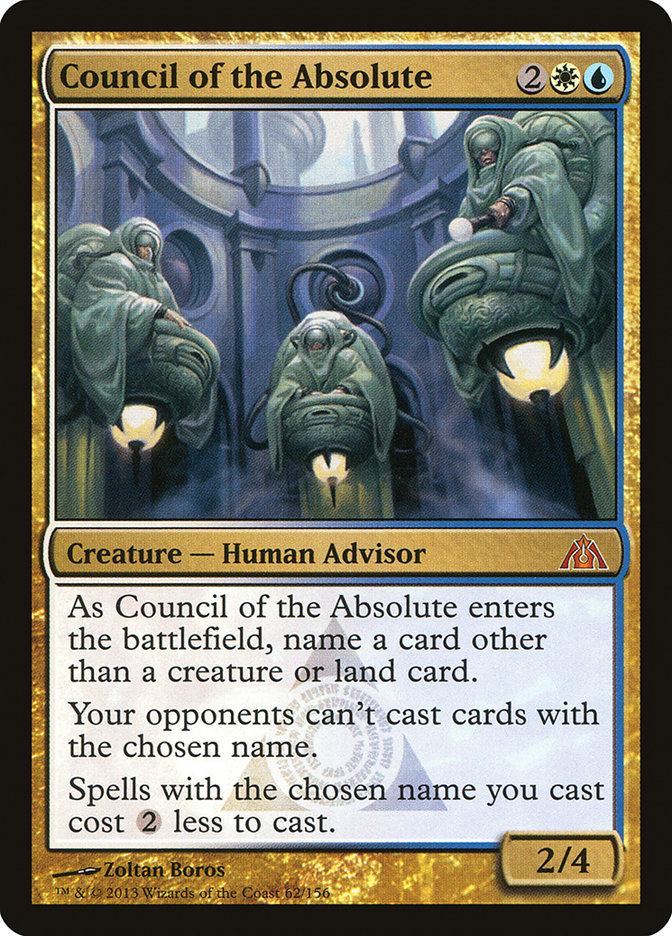Council of the Absolute Carta MTG
| Custo de mana | |
| Custo convertido de mana | 4 |
| Raridade | Mítica |
| Tipo | Creature — Human Advisor |
| Lançamento | 2013-05-03 |
| Expansão símbolo | |
| Expansão nome | Dragon's Maze |
| Expansão código | DGM |
| Ataque | 2 |
| Defesa | 4 |
| Número | 62 |
| Frame | 2003 |
| Layout | Normal |
| Border | Preta |
| Ilustrado por | Zoltan Boros |
Texto da carta
As Council of the Absolute enters the battlefield, name a card other than a creature or land card. Your opponents can't cast cards with the chosen name. Spells with the chosen name you cast cost less to cast.
Texto da carta Council of the Absolute
As Council of the Absolute enters the battlefield, name a card other than a creature or land card. Your opponents can't cast cards with the chosen name. Spells with the chosen name you cast cost less to cast.
Onde comprar
Se você deseja comprar um cartão Council of the Absolute MTG de um conjunto específico como Dragon's Maze, há diversas opções confiáveis a serem consideradas. Uma das principais fontes é a loja de jogos local, onde muitas vezes você pode encontrar boosters, cartas individuais e decks pré-construídos de conjuntos atuais e de alguns conjuntos anteriores. Eles geralmente oferecem o benefício adicional de uma comunidade onde você pode negociar com outros jogadores.
Para um inventário mais amplo, especialmente de conjuntos mais antigos, mercados on-line como TCGPlayer, Card Kingdom e Card Market oferecem seleções extensas e permitem que você pesquise cartas de conjuntos específicos. Grandes plataformas de comércio eletrônico, como eBay e Amazon, também têm listagens de vários vendedores, o que pode ser um bom lugar para procurar produtos lacrados e achados raros.
Além disso, o site oficial do Magic geralmente tem um localizador de lojas e listas de varejistas para encontrar a Wizards of the Produtos licenciados pela Costa. Lembre-se de verificar a autenticidade e a condição dos cartões ao comprar, especialmente de vendedores individuais em mercados maiores.
Abaixo está uma lista de alguns sites de lojas onde você pode comprar os Council of the Absolute e outras cartas MTG:
 COMPRAR
COMPRAR BurnMana é parceiro oficial da TCGPlayer
- eBay
- Card Kingdom
- Card Market
- Star City Games
- CoolStuffInc
- MTG Mint Card
- Hareruya
- Troll and Toad
- ABU Games
- Card Hoarder Magic Online
- MTGO Traders Magic Online
Veja produtos de MTG
Legalidades
Magic the Gathering formats where Council of the Absolute has restrictions
| Formato | Legalidade |
|---|---|
| Commander | Válida |
| Legacy | Válida |
| Modern | Válida |
| Oathbreaker | Válida |
| Vintage | Válida |
| Duel | Válida |
| Pioneer | Válida |
| Penny | Válida |
Regras e informações
O guia de referência para regras de cartas de Magic: The Gathering Council of the Absolute fornece decisões oficiais, quaisquer erratas emitidas, bem como um registro de todas as modificações funcionais que ocorreram.
| Data | Texto |
|---|---|
| 2013-04-15 | If a spell with the chosen name includes one generic mana in its cost to cast, that cost will be reduced by . |
| 2013-04-15 | If there are additional costs to cast the spell, such as kicker costs, apply those increases before applying cost reductions. |
| 2013-04-15 | If you name half of a split card with fuse, and then you cast both halves, the cost reduction will apply to the total cost of the spell. This is true even if the half with the chosen name requires only colored mana to cast. |
| 2013-04-15 | The last ability can reduce alternative costs such as overload costs. |
| 2013-04-15 | The last ability can’t reduce the colored mana requirement of a spell. |
| 2013-04-15 | You can name either half of a split card, but not both. If you name half of a split card, your opponents can cast the other half. If that split card has fuse, your opponents can’t cast that card as a fused split card. |
